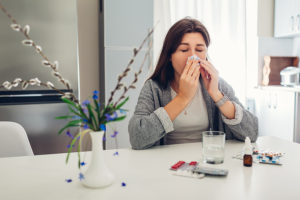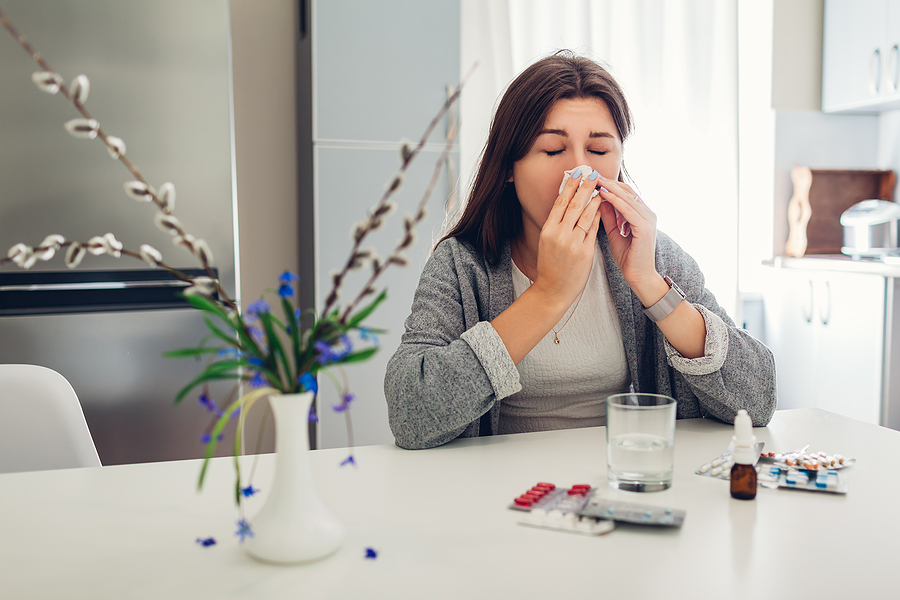All patients must see our physician before receiving COVID-19 (Coronavirus) PCR testing.
COVID-19-related visits include a physician evaluation and a PCR test, which is the most accurate test available. The PCR test is billed to your insurance by the outside lab and results are typically available in 2-4 days.
A Quidel Rapid Antigen COVID-19 test (results in 15 minutes) may be added on the same day as a physician visit for a cash-pay price of $75.
The Rapid Antigen cash-pay price for asymptomatic patients who are uninsured or need testing for travel or employment is $100.
There is a $25 cash-pay price for the blood draw for an Antibody Test. Check with your insurance provider to see if they will cover the lab cost.
What Is the Difference Between Seasonal Allergies and COVID-19?

For seasonal allergy sufferers, the novel coronavirus disease 2019 (COVID-19) pandemic has added a new wrinkle to the already challenging allergy season, when high levels of airborne pollen often trigger the body’s immune system to overreact. Commonly referred to as hay fever, seasonal allergies are nothing to sneeze at—the symptoms can make life miserable—but they are not contagious and can usually be managed with treatment.
On the other hand, COVID-19 is a highly contagious viral illness caused by a SARS-CoV-2 infection. The virus mainly spreads when respiratory droplets become airborne after an infected person coughs, sneezes, or speaks, and then are inhaled by an uninfected person. With COVID-19 spreading like wildfire around the world, many people are now understandably concerned about symptoms that they might have once viewed as harmless, such as a mild cough.
Although seasonal allergies and COVID-19 are similar in some ways, there are some notable differences between the two, such as:
The Symptoms
Both seasonal allergies and COVID-19 can cause coughing, wheezing, headache, fatigue, a sore throat, and nasal congestion or a runny nose. However, some of the most prominent signs of hay fever—sneezing and itchy, watery eyes—are not usually associated with COVID-19. Likewise, some telltale signs of COVID-19—fever, chills, body aches, and a new loss of taste or smell—do not typically result from seasonal allergies.
The Timeline
Seasonal allergy symptoms tend to be long-lasting as compared to COVID-19 symptoms, which typically resolve within a week or two. Additionally, a history of hay fever is a very telling factor. Many seasonal allergy sufferers experience recurrent bouts of symptoms year after year.
The Treatment
Some of the symptoms shared by seasonal allergies and COVID-19 can be relieved with over-the-counter medications like pain relievers and nasal decongestants. However, a key differentiator is that many seasonal allergy symptoms—such as sneezing, a runny nose, and itchy, water eyes—respond well to antihistamine treatment, which has no effect on COVID-19 symptoms.
The Right Care at the Right Time
The only way to confirm a COVID-19 diagnosis is to be tested by a medical professional. If you would like to be tested, turn to South Tampa Immediate Care in Tampa, FL. You can book your appointment here. Regardless of whether you need help dealing with seasonal allergies or COVID-19, we’ll start by getting to the bottom of your illness. In addition to offering PCR testing and rapid antigen testing to detect an active COVID-19 infection, we offer COVID-19 antibody testing to detect a past COVID-19 infection.
To learn more, contact us or stop by today.













